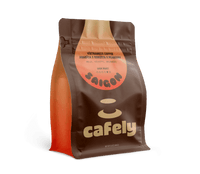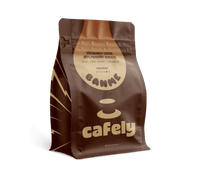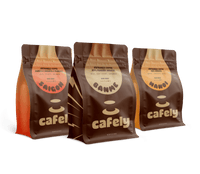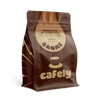Yerba maté has blown up as an alternative to coffee and sodas in the past years. The drink is made from steeped leaves and twigs that contain high levels of caffeine and antioxidants.
The caffeine content of yerba maté depends on the brewing method and species. However, an average cup of yerba maté has 80 mg of caffeine.
The drinking habits of yerba maté generally involve many cups — resulting in significantly higher total caffeine levels. Many yerba maté drinkers claim this drink offers the same energizing benefits of coffee without the negative side effects like jitteriness, anxiety, and insomnia.
In this article, we explore the caffeine content of yerba maté, its health benefits, and how it compares to other caffeinated beverages.
How Much Caffeine Is in Yerba Maté?
The brewing method and where the tea is harvested from contribute to the caffeine content of yerba maté. A typical serving of the beverage has between 30 and 180 mg of caffeine, but on average, a cup will have around 80 mg [1].
With around 50 grams of loose-leaf maté prepared in the traditional style, you’ll get around 150 to 200 mg of caffeine. However, you get this caffeine over a longer period of time, and the content gradually decreases as you drink, giving you a steady, long-lasting energy boost.
Yerba Maté vs. Other Caffeinated Drinks
Yerba maté and coffee have similar caffeine content, but what about other caffeinated beverages?
Here’s a quick comparison of how yerba maté matches up against coffee, coca-cola, tea, and energy drinks:

1. Yerba Maté vs. Coffee
A standard cup of yerba maté and coffee have very similar levels of caffeine. However, there are so many ways of brewing both beverages that caffeine levels vary.
Take espresso coffee, for example. A tiny one-ounce espresso serving size has 64 mg of caffeine — a staggering amount compared to a cup of drip coffee. Because the beans are finely ground, pressed, and filtered, you get an extremely concentrated caffeine hit.
Drinks like Vietnamese coffee are also highly concentrated, as their brewing method is similar to espresso. Traditional Vietnamese coffee uses a phin drip filter and finely ground robusta beans. This combination makes a standard four- to six-ounce cup of Vietnamese coffee with somewhere between 66 and 130 mg of caffeine.
Coffee beans are also a major contributing factor to the amount of caffeine coffee produces. The less caffeinated Arabica bean (the most popular bean in the US) is much weaker than robusta beans, which have twice the caffeine content.
2. Yerba Maté vs. Energy Drinks
Energy Drinks pack a serious punch, but you may be surprised that some cans have a similar caffeine content compared to yerba maté. For example, we know that one serving (five ounces) of yerba maté has 80 mg of caffeine. Comparatively, one serving of Monster Energy Drink has 86 mg of caffeine.
So what’s the catch? Well, one serving size of Monster Energy Drink is actually around half a can. So, if you’re drinking a full 16 oz of Monster Energy, you’re consuming 160 mg of caffeine.
This is also true for Red Bull. A 12 oz Red Bull can has 111 mg of caffeine, but the 8.4 fl oz. can has a similar amount of caffeine as one serving of yerba maté.
You should also consider the other added ingredients in energy drinks that may give a big boost of energy. On the downside, they also have a lot of sugar, artificial sweeteners, and other preservatives that give you a jittery, wired energy boost that isn’t too pleasant.
3. Yerba Maté vs. Other Teas
So you may be wondering where yerba maté ranks compared to other teas. When it comes to caffeine, it sits somewhere in the middle.
Green tea usually has around 20 to 45 mg of caffeine per cup, while black tea ranges from 40 to 70 mg. Matcha green tea, on the other hand, has 100 mg of caffeine in two grams.
But there is a difference in the way yerba maté delivers caffeine. It’s not just a quick spike — it’s a steady, longer-lasting energy boost.
Related: Coffee vs. Tea: Which has more caffeine?
How Preparation Methods Affect Caffeine Levels in Yerba Maté
Yerba maté is quite versatile — the traditional preparation method involves a specialized filter straw (called a bombilla) and gourd. Other methods involve the French press, teabags, or simple infusion brewer.
The way you prepare yerba maté will impact the total amount of caffeine you extract from the leaves:
1. Traditional Brewing Method (Gourd & Bombilla)
Let’s take a look at how to brew yerba maté the traditional way:
- Fill the gourd with maté leaves until it’s around three-quarters full.
- Tilt the gourd in one direction, so you have space for the bombilla, or metal straw, with the filter end towards the bottom. Make sure no maté leaves get into the straw.
- Heat the water to just under its boiling point — around 150 to 180 degrees Fahrenheit.
- While the water heats up, pour some cold water over the leaves. Drain the water without dumping out the tea leaves.
- Pour in the hot water until it reaches the leaves.
- Allow the mixture to brew for three to five minutes before serving.
- Refill the gourd with hot water around 10 to 15 times, depending on the quality of the leaves.
2. French Press
Using a French Press for yerba maté is a convenient way to prepare it — just don’t do it around yerba maté traditionalists.
Here’s how you make maté with a French Press:
- Cover the bottom of the French Press with about an eighth or more of loose-leaf yerba maté.
- Add five ounces of hot water and let it steep for at least one minute.
- After it's done brewing, press the top down, and your maté is ready.
- Pour your tea into your mug or whatever container you like.
For the first press, you’ll get around 70 mg per cup of brewed yerba maté.
Like the gourd, you can also reuse the leaves a couple of times. But because French Presses generally have more water capacity, you won’t be able to use the leaves as many times as a gourd.
3. Cans
The canned, pre-brewed yerba maté is even more convenient than the French Press. Brands like Guayaki have cold versions of this product, even offering different flavors for those who don’t like the grassy natural flavor of loose leaf maté.
Here are some of the most popular canned yerba maté brands and how much caffeine is in them:
- Guayaki Sparkling Cans — 80 to 120mg
- Clean Cause Organic Yerba Maté — 160 mg
- Mateina Yerba Maté Lemon Original — 120 mg
Dosage: How Much Yerba Maté Is Too Much?
Yerba maté is celebrated for its potential health benefits, but is there too much of a good thing? Though many maté enthusiasts will say there’s no limit to the amount you can drink, there are some potential adverse side effects.
All of the side effects are attributed to the tea's high caffeine content. Studies have found that consuming more than 400 mg of caffeine a day leads to a handful of negative effects [6].
Yerba maté’s traditional drinking method of repeatedly pouring hot water over the tea leaves makes it somewhat more complicated to measure the amount of caffeine most maté drinkers consume. One portion of tea leaves in a gourd can measure up to 260 mg of caffeine.
So, generally speaking, you’d want to limit yourself to fewer than two gourds of yerba maté in a day.
Health Benefits of Yerba Maté

One of the major draws of switching to yerba maté for your daily dose of caffeine is the potential health benefits attributed to the South American beverage.
Here are some positive attributes of yerba maté:
1. Source of Antioxidants & Nutrients
Yerba maté is rich in antioxidants, vitamins, and nutrients. Vitamins C, B1, B2, and B6 are present in the dried leaves of yerba maté [1]. B vitamins are essential for your body’s metabolism to function correctly; they may improve digestion, boost your energy levels, and help you lose weight [2].
Additionally, one liter of yerba maté contains enough bioactive compounds, acids, and elements for your daily requirement of antioxidants [3]. This could help to lower cholesterol levels and reduce obesity and hypertension.
2. Energy Boost Without the Jitters
Regular yerba maté drinkers often claim they get all the benefits of caffeine, like increased energy and focus, without the negative effects associated with other high-caffeine beverages. This could be linked to the yerba maté's combination of caffeine and another compound called theobromine.
Though theobromine isn’t as widely studied as caffeine, some researchers believe that the two compounds work together to provide the positive effects of caffeine without the side effects [4]. That means fewer jitters and a calmer, cleaner energy than caffeine alone.
3. Heart Health & Cholesterol
Studies show the high antioxidant levels found in yerba maté may help improve heart health. One study, in particular, reported that drinking a moderate amount of yerba maté helps reduce blood pressure and triglyceride levels [5].
FAQs: Caffeine in Yerba Maté Tea

If you still have questions about caffeine in yerba maté or the tea itself, check out our FAQs below.
1. How Much Caffeine is in a Typical Serving of Yerba Maté?
The average serving of yerba maté has around 80 mg of caffeine, but the exact amount depends on the brewing method and type of maté you’re using. The traditional brewing method will get you the most caffeine — around 150 to 200 mg.
French Press maté has a slightly more reasonable amount of caffeine — 70 mg in the first cup brewed.
2. Can Drinking Yerba Maté Improve My Health?
Yes, there are plenty of health benefits associated with yerba maté. Besides the daily energy boost the tea is known for, you can also expect extra antioxidants, nutrients, and vitamins. Scientists believe the drink may help prevent heart disease and lower cholesterol.
3. Is Yerba Maté Better for Me Than Coffee?
Because yerba maté has theobromine in addition to caffeine when brewed, the beverage gives a more balanced energy boost compared to coffee. Maté drinkers swear the drink doesn’t get you as jittery as coffee. It also has more antioxidants, vitamins, and nutrients than coffee.
4. How Should I Prepare Yerba Maté to Maximize its Benefits?
The best way of brewing yerba maté is with a gourd and bombilla. This gives you a stronger dose of caffeine earlier, slowly decreasing the amount of caffeine throughout the day.
5. Can I Drink Yerba Maté Every Day?
Yes, yerba maté is safe to drink daily, as long as you don’t exceed over 400 mg of caffeine.
6. Does Yerba Maté Cause Any Side Effects?
Yerba maté’s negative side effects are mostly due to its caffeine content. If you drink too much, it can cause an upset stomach, insomnia, increased blood pressure, headaches, and more.
7. What Are the Best Times to Drink Yerba Maté?
Like coffee, the best time to drink yerba maté is in the morning. You want to gradually stop drinking the beverage throughout the day, as the caffeine may affect your sleep. In addition, experts say to avoid coffee starting 6-8 hours before bedtime.
8. Can Pregnant Women Drink Yerba Maté?
Yes, pregnant women can drink yerba maté in reasonable amounts. The American College of Obstetricians and Gynecologists suggests pregnant women can safely have around 200 mg of caffeine daily [7].
9. How Does Yerba Maté Affect Mental Focus?
The combination of caffeine and theobromine provides a massive boost in energy and mental focus throughout the day.
10. Is Yerba Maté Addictive?
Yes, yerba maté is addictive, mostly because of its caffeine content. Because caffeine creates dependence and withdrawal, it is classified as an addictive substance [8]. If you drink yerba maté for an extended period and stop, you may experience anxiety, depression, and irritability.
References
- Gawron-Gzella A, Chanaj-Kaczmarek J, Cielecka-Piontek J. yerba maté-A Long but Current History. Nutrients. 2021 Oct 21;13(11):3706. doi: 10.3390/nu13113706. PMID: 34835962; PMCID: PMC8622869.
- Hanna M, Jaqua E, Nguyen V, Clay J. B Vitamins: Functions and Uses in Medicine. Perm J. 2022 Jun 29;26(2):89-97. Doi: 10.7812/TPP/21.204. Epub 2022 Jun 17. PMID: 35933667; PMCID: PMC9662251.
- Rząsa-Duran E, Kryczyk-Poprawa A, Drabicki D, Podkowa A, Sułkowska-Ziaja K, Szewczyk A, Kała K, Opoka W, Zięba P, Fidurski M, Muszyńska B. yerba maté as a Source of Elements and Bioactive Compounds with Antioxidant Activity. Antioxidants (Basel). 2022 Feb 12;11(2):371. doi: 10.3390/antiox11020371. PMID: 35204253; PMCID: PMC8868397.
- Martínez-Pinilla E, Oñatibia-Astibia A, Franco R. The relevance of theobromine for the beneficial effects of cocoa consumption. Front Pharmacol. 2015 Feb 20;6:30. Doi: 10.3389/fphar.2015.00030. PMID: 25750625; PMCID: PMC4335269.
- Sarria B, Martinez-Lopez S, Garcia-Cordero J, Gonzalez-Ramila S, Mateos R, Bravo L. yerba maté improves cardiovascular health in normocholesterolemic and hypercholesterolemic subjects. Proceedings of the Nutrition Society. 2020;79(OCE2):E635. doi:10.1017/S0029665120005844
- Reyes CM, Cornelis MC. Caffeine in the Diet: Country-Level Consumption and Guidelines. Nutrients. 2018 Nov 15;10(11):1772. doi: 10.3390/nu10111772. PMID: 30445721; PMCID: PMC6266969.
- ACOG Committee Opinion No. 462: Moderate caffeine consumption during pregnancy. Obstet Gynecol. 2010 Aug;116(2 Pt 1):467-468. doi: 10.1097/AOG.0b013e3181eeb2a1. PMID: 20664420.
- Sulaiman N, Pieroni A, Sõukand R, Whitney C, Polesny Z. Socio-Cultural Significance of yerba maté among Syrian Residents and Diaspora. Econ Bot. 2021;75(2):97-111. doi: 10.1007/s12231-021-09523-6. Epub 2021 Sep 10. PMID: 34522052; PMCID: PMC8431956.









